We love natural, we love organic. But is there a difference?
There is! And it’s good to know what’s what, because if we want to make good choices, it pays to be informed.
When it comes to labelling food either natural, or organic - it's fairly straightforward. But products like cosmetics and beauty products may need a bit more definition.
Read on and let’s clear this one up!
What is an Organic Product?
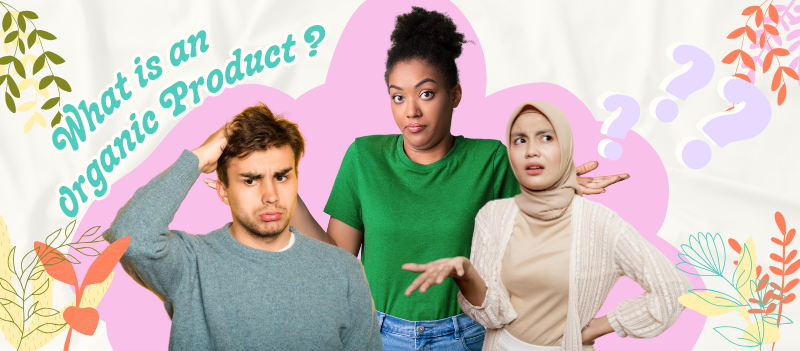
Organic can be a food, cosmetic or wellness product. It means its ingredients are produced in an organic way.
What’s labelled as ‘Organic’ in the UK is defined by The Soil Association https://www.soilassociation.org
And in America, by The USDA (United States Department of Agriculture) https://www.usda.gov/topics/organic
So far, so good!
What does ‘organic’ actually mean?
Organic means “relating or derived from living matter”. (Plants, animals and minerals).
And, when related to production:
So, food can be organic. And the ingredients in your cosmetics like body wash, shampoo, makeup, can also be organic if they have been produced without chemicals and pesticides.
Organic food and products have a pretty strict definition by law. Read on for how that’s done.
Are Organic Products Regulated?
Yes. In the UK, it's The Soil Association that awards Organic Certification. They certify a product as organic by these rules:
- Organic farming doesn’t allow any synthetic pesticides and absolutely no herbicides.
- Farmers are permitted to use just 15 pesticides derived from natural ingredients, but only under very restricted circumstances.
- No artificial colours and preservatives are used.
- The highest standards of animal welfare are maintained.
- There is no routine use of antibiotics on animals.
- All organic products are GM Free
In the US, it's the USDA that certified what can be labelled organic. USDA Organic is the only federally regulated organic label. Organic certification means that farmers and businesses have met strict standards for the growing, processing and handling of their products.
If you see the USDA organic seal, the product is certified organic and has 95 percent or more organic content. These standards are strictly maintained and monitored by the government, so that consumers can be sure of what they’re getting.
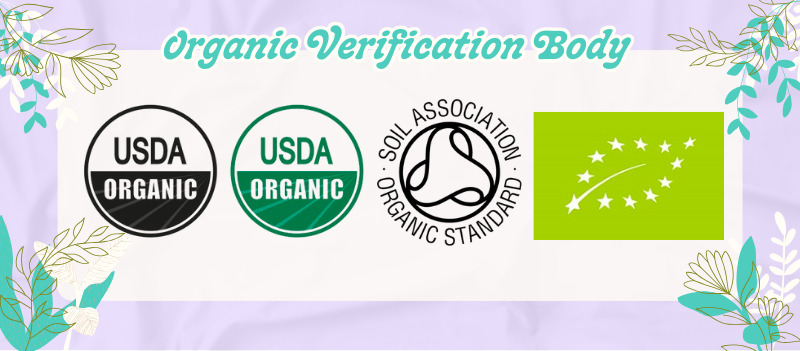
What is an 'organic beauty' product?
The UK Soil Association says this:
For a cosmetic product to be ‘labelled’ organic, the ingredients must meet this criteria. So you can know that your moisturiser doesn't have herbicides lurking somewhere in its component parts!
Health and environmental benefits of organic products.
The health and environmental benefits of organic products are clear. With limited pesticides, no herbicides, no artificial ingredients, what you are putting into, and on your body has less chemicals and man made substances.
Organic production has minimal chemicals and due care for animals, the natural environment and soils. So it has a minimal negative environmental impact compared to non-organic methods.
What is a Natural Product?
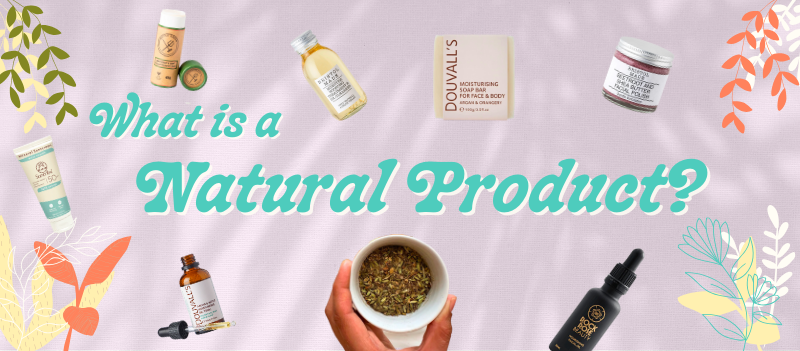
A ‘natural’ product means something that is made of mostly natural ingredients. But that doesn’t mean those ingredients are organic. This is where the vagueness, and confusion comes in.
What does natural mean?
‘Natural’ means “existing in or derived from nature; not made or caused by humankind.”
The Food Standards Agency in the UK says.
“Natural means essentially that the product is composed of natural ingredients, e.g. ingredients produced by nature, not the work of man or interfered with by man”.
They also say that anything Natural must also be GM (Genetically Modified) Free.
So, ‘natural’ products are made up only of ingredients found in nature like plants, minerals or animals! If anything is added that's man-made or GM, it means they aren't ‘100%’ natural.
Stick with us!
However, bodies like the FSA only define what ‘natural’ is. Unlike ‘organic’ products, they do not certify products as natural. But there are quite a few reliable trademarks that will certify a ‘natural’ product. Just not government ones.
See further on for some certifications of ‘natural’ products.
Are natural products healthy and sustainable?
It feels healthier to eat or use natural products because we’re unsure of ‘man made’ ingredients - what chemicals, additives, preservatives etc are included.
It's not easy to understand the scientific names on an ingredients list. We might shudder at ‘formaldehyde’ but does anyone know what ‘methylchloroisothiazolinone’ is? Yikes.
Natural products are less processed because the aim is to keep ingredients in their natural state and with less man made additives. So, they are more environmentally sustainable.
Are Natural Products Regulated?
Not as strictly as organic products. Calling something ‘natural’ with no benchmark means products can be marketed as ‘green’ but in fact, are anything but!
But there are some well respected and reliable third party certifications out there.
The British Beauty Council says this:
“We recommend looking for certifications to third-party standards to ensure the brands you are buying are using their ingredient claims in an honest and clear way (as certifications and third-party standards have independent testing measures to ensure quality and consistency).
As definitions such as ‘natural’ are not regulated, products can sometimes include ingredients that are more irritating and harmful than those they are trying to exclude (by not being natural). Products labelled ‘all natural’ capture the importance of knowing what to look out for.”
Here are some great third party organisations that support natural products, and allow their logo to be used. They are good indicators that a natural product has stood up to scrutiny by experts.
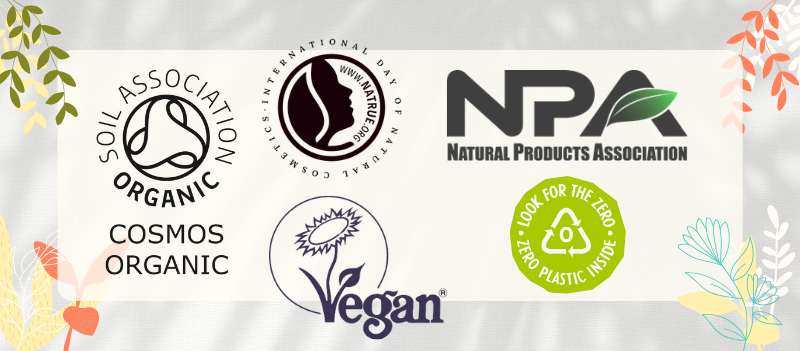
Best Trademark Certifications for Natural Beauty Products
The Soil Associations COSMOS Natural: established to certify in the cosmetic industry. All products with the Soil Association COSMOS logo guarantee:
- NO Animal testing
- NO GM ingredients
- NO Controversial chemicals
- NO Parabens and Phthalates
- NO Synthetic colours, dyes or fragrances
NATRUE: certification brand of The International Natural and Organic Cosmetics Association. They promote natural and organic products worldwide. They certify over 6700 products and 280 brands.
The Natural Products Association (NPA) : largest US nonprofit organisation dedicated to the natural products industry. It operates the Natural Seal labels for natural products in the US.
So, ‘natural’ products can be certified.
There are other certs that will tell you you’re getting a product made with the planet in mind, and they are worth a mention here.
The Vegan Trademark: guarantees the product is 100% vegan
The Zero Plastic Inside logo: products contains no plastic in their formulas https://www.beatthemicrobead.org/zero-products/
Eco-Cert: certifies products across farming, cosmetics, fair trade, carbon neutrality and indicates good sustainability and eco-credentials.
So, Organic and Natural - what’s the Big Difference?
Let’s keep it as simple as we can!
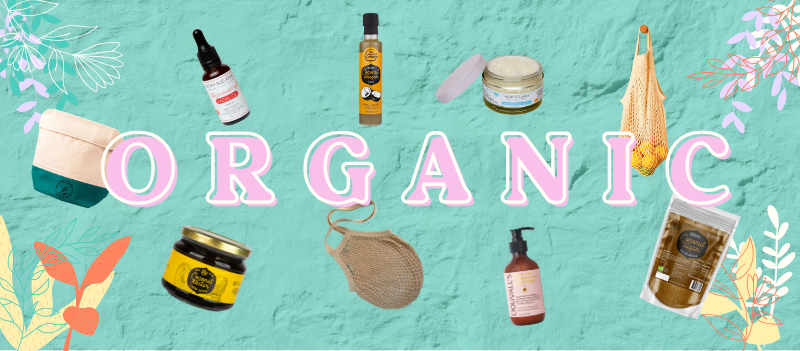
Organic
- An Organic product (food or cosmetic) comes from ‘natural’ sources - ‘living matter’, so not man-made.
- It has been tested and certified that it, or its ingredients have been farmed or produced to a set of regulated standards.
- The standards are concerned with types and amounts of chemicals used, if they were produced with standard care for the environment (animals, soils, people)
- Organic products are certified by governments.
Natural
- A Natural product is defined by how much of it is made from natural ingredients (animal, mineral, plant).
- What is ‘natural’ is not government regulated, but can be certified by respected organisation (such as The Soil Association COSMOS, Eco-Cert or Natrue)
- A percentage of a product might be natural, but could also contain a percentage of man-made ingredients.
- Natural does not necessarily mean ingredients are ‘organic’.
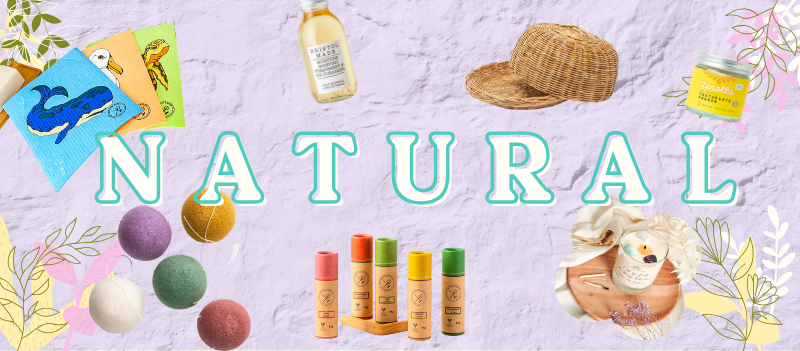
Got it? Great! But what does this all mean for us, the consumer?
Overall, organic and natural means better choices for our health and for the environment. Both avoid excessive man-made (chemical) ingredients. Both mean more sustainable production practices are likely to be used.
However, neither is perfect! Organic farming methods may still be industrial in scale, albeit with more controlled chemical input.
‘Natural’ can be claimed with a fair amount of vagueness. So for truly natural, look for certifications, like the ones we’ve mentioned in this blog, and always read that ingredient label!!
The great news is .. more and more of us are demanding truly natural and organic goods and the market and suppliers are responding. There are great food and cosmetic products out there that are genuinely made with natural and organic ingredients because companies know we care about it.
At Organics, we like small indy companies. Because we check all our sellers, we know that they have smaller scale production, often small batch production methods. This means products are made without big industrial processes. And ingredients are selected with care and love 🙂
Hope this blog has cleared up some of the confusion over natural and organic, and whether natural and organic products are better for you. We say yes!
Keep it natural, organic, and keep on loving yourself and your planet!




Leave a comment
All comments are moderated before being published.
This site is protected by hCaptcha and the hCaptcha Privacy Policy and Terms of Service apply.